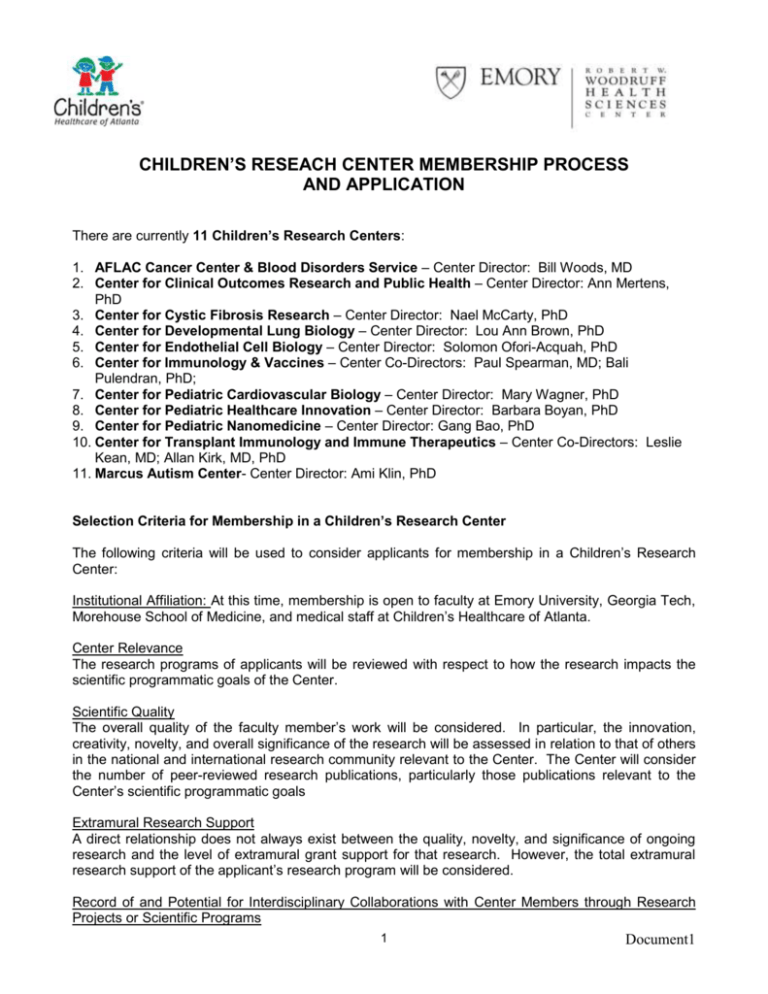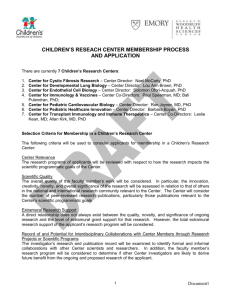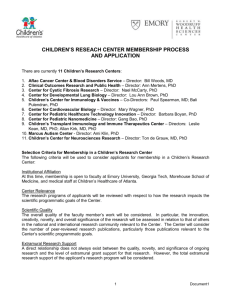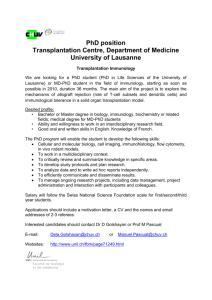EMORY UNIVERSITY - Atlanta Pediatric Research
advertisement

CHILDREN’S RESEACH CENTER MEMBERSHIP PROCESS AND APPLICATION There are currently 11 Children’s Research Centers: 1. AFLAC Cancer Center & Blood Disorders Service – Center Director: Bill Woods, MD 2. Center for Clinical Outcomes Research and Public Health – Center Director: Ann Mertens, PhD 3. Center for Cystic Fibrosis Research – Center Director: Nael McCarty, PhD 4. Center for Developmental Lung Biology – Center Director: Lou Ann Brown, PhD 5. Center for Endothelial Cell Biology – Center Director: Solomon Ofori-Acquah, PhD 6. Center for Immunology & Vaccines – Center Co-Directors: Paul Spearman, MD; Bali Pulendran, PhD; 7. Center for Pediatric Cardiovascular Biology – Center Director: Mary Wagner, PhD 8. Center for Pediatric Healthcare Innovation – Center Director: Barbara Boyan, PhD 9. Center for Pediatric Nanomedicine – Center Director: Gang Bao, PhD 10. Center for Transplant Immunology and Immune Therapeutics – Center Co-Directors: Leslie Kean, MD; Allan Kirk, MD, PhD 11. Marcus Autism Center- Center Director: Ami Klin, PhD Selection Criteria for Membership in a Children’s Research Center The following criteria will be used to consider applicants for membership in a Children’s Research Center: Institutional Affiliation: At this time, membership is open to faculty at Emory University, Georgia Tech, Morehouse School of Medicine, and medical staff at Children’s Healthcare of Atlanta. Center Relevance The research programs of applicants will be reviewed with respect to how the research impacts the scientific programmatic goals of the Center. Scientific Quality The overall quality of the faculty member’s work will be considered. In particular, the innovation, creativity, novelty, and overall significance of the research will be assessed in relation to that of others in the national and international research community relevant to the Center. The Center will consider the number of peer-reviewed research publications, particularly those publications relevant to the Center’s scientific programmatic goals Extramural Research Support A direct relationship does not always exist between the quality, novelty, and significance of ongoing research and the level of extramural grant support for that research. However, the total extramural research support of the applicant’s research program will be considered. Record of and Potential for Interdisciplinary Collaborations with Center Members through Research Projects or Scientific Programs 1 Document1 The investigator’s research and publication record will be examined to identify formal and informal collaborations with other Center scientists and researchers. In addition, the faculty member’s research program will be considered to determine if other Center investigators are likely to derive future benefit from the ongoing and proposed research of the applicant. Terms and Requirements of Membership in a Children’s Research Center * Please refer to the Policy for Children’s Research Center Membership for complete detail * Except in unusual circumstances, a faculty member may be awarded Primary Membership to no more than two Children’s Research Centers, but may be awarded Affiliate Membership to any number of Children’s Research Centers. Membership in the Center will be reviewed annually by Center leadership and triennially by the Research Advisory Council. Demonstration of substantial participation in Center activities will be required for continued membership in a Center. We recognize that members of the Center will not be able to participate in all Center activities because of various professional and personal obligations that may occasionally overlap or interfere with Center activities. Nonetheless, for Center Primary Members, participation in Center Meetings and Center Retreats are essential. Attendance at the Jay Berkelhamer Pediatric Research Grand Rounds, Center Seminar Series, and any Center Journal Clubs are strongly encouraged. Membership applications should be submitted to the Director of the particular Center of interest. The membership process will be in two phases. First, Directors of the Children’s Research Centers will review proposed members with their Steering Committees or similar Internal Advisory Boards, and submit names to the Research Advisory Council of those investigators whom they deem acceptable for one of the levels of membership. Applicants are encouraged to meet with the Center Director. The Research Advisory Council will then review all members proposed by Programs, and be charged with a consistent policy of assignment as a Primary Member (full or provisional), or Affiliate Member. Membership in a Center will be reviewed annually by the Center Director. Membership applications must be renewed every three years. Members will be required to submit a 4-page NIH biosketch (in new 2010 format) including research support information, and a paragraph describing their current research and interactions with the Center. Renewals will be reviewed first by the individual Center Directors, to guarantee that such members are actively involved in scientific operations; and then by the Research Advisory Council. The Children’s Research Centers AFLAC Cancer Center & Blood Disorders Service The AFLAC Cancer Center & Blood Disorders Service has built strong research programs in Sickle Cell, Innovative Therapies, Hemostatis/Thrombosis, Cancer Survivorship, Blood and Marrow Transplant, and Solid Tumors. Specifically, the Aflac Cancer Center concentrates its research in four main areas: Brain tumors, Neuroblastoma, Sickle cell disease, Clotting disorders. In turn, the modalities used to help fight these conditions include: a) Innovative therapy, when a standard treatment is not working or has not been developed for a particular disease; b) Blood and marrow transplant (BMT), a specialized form of experimental therapy requiring major resources; c) Survivorship, doing everything we can for children who are either cured of their disease, or who live with their disease in a chronic fashion, so they can become healthy and productive adults. Center Director: Bill Woods, MD, William.woods@choa.org 2 Document1 Center for Clinical Outcomes Research and Public Health This new and exciting center falls under the Clinical Outcomes and Public Health theme. This center centralizes and coordinates outcomes and epidemiologic research throughout the system, emphasizing strong ties to the Rollins School of Public Health at Emory University and to the Centers for Disease Control. The Center also synergizes with Children’s plans for new wellness initiatives impacting the health of Georgia’s children. Center Director: Ann Mertens, PhD, ann.mertens@choa.org Center for Cystic Fibrosis Research Cystic Fibrosis (CF) is the leading serious genetic disorder in the Caucasian population, and Children’s Healthcare of Atlanta and Emory University share the largest pediatric CF clinic in the nation. This center focuses research efforts on developing new therapies, drugs and new devices that improve the quality and longevity of the lives of CF patients. The Center is addressing all three components of the triad of CF lung disease: inflammation, infection and epithelial transport. Programs range from basic research on the underlying pathogenesis of CF to outcomes research defining the best treatment and prevention regimens for this group of children and young adults. Specific programs in CF-associated diabetes, the role of oxidative stress on pulmonary pathology in the CF lung, and airway ecology of the CF lung are in place. Center Director: Nael McCarty, PhD, namccar@emory.edu Center for Developmental Lung Biology This center focuses research efforts on the impact of chronic oxidative stress in the pathologies associated with the developing lung. The Center examines the mechanisms by which chronic pulmonary oxidative stress exacerbates pediatric pulmonary pathologies, develops potential biomarkers in the exhaled breath or tracheal aspirate that will lead to early identification of patients with chronic pulmonary oxidative stress as well as biomarkers that can be used to monitor disease management and develop therapeutic strategies to reduce pulmonary oxidative stress and risk of lung injury. Center Director: Lou Ann Brown, PhD, lbrow03@emory.edu Center for Endothelial Cell Biology This center focuses research efforts to identify and clinically validate innate endothelial defenses that can be developed as therapeutic strategies to augment endothelial barrier function in children exposed to disparate acquired, genetic and treatment-induced insults. Center Director: Solomon Ofori-Acquah, PhD, soforia@emory.edu. Center for Immunology and Vaccines This center leverages existing strengths at area institutions, including the Emory Vaccine Center and the CDC, to build a cross-disciplinary research center for the development of new vaccines and treatments for infectious diseases affecting children. Programmatic research within the Center includes Microbial Pathogenesis and Host-Pathogen Interactions, Innate Immunity, Neonatal/ Developmental Immunology, Primary and Acquired Immunodeficiencies of Childhood, and Clinical Vaccinology. In addition to bringing together investigators with expertise in these areas, major new recruitments are being pursued to build strengths in each of these programs. An Immunology Core Laboratory and a Flow Cytometry Core are being established in the Center that will serve the needs of investigators throughout all of the Research Centers. Center Director: Paul Spearman, MD, pspearm@emory.edu and Bali Pulendran, PhD, bpulend@emory.edu Center for Pediatric Cardiovascular Biology This center focuses research efforts on examining unique aspects of cardiac disorders in the young to reduce the morbidity of pediatric heart disease. Within the Cardiovascular Biology 3 Document1 Center, the following programs exist: Cardiac Imaging, Cardiac Development, Cardiac Failure, Genetic Determinants of Cardiac Outcomes and Cardiac Neuroprotection. Center Director: Mary Wagner PhD, mbwagne@emory.edu Center for Pediatric Healthcare Innovation This center takes advantage of strong engineering expertise at Georgia Tech, and builds on existing collaborations between investigators at Tech and surgical faculty in Children’s Craniofacial and Urology Service Lines. The Center for Technology Innovation is developing new techniques, technologies and therapeutics to diagnose, treat and cure diseases and conditions that affect children. Collaborative projects on tissue engineering and regenerative medicine, urologic surgery, cancer diagnosis and therapy, and sickle cell disease are in development. Center Director: Barbara Boyan, PhD, Barbara.boyan@bme.gatech.edu Center for Pediatric Nanomedicine The Center for Pediatric Nanotechnology is committed to developing nanomedicine to its full potential. The center's researchers study and engineer nanotechnology to develop effective, therapeutic nanomedicine. Because it can be applied to many pediatric diseases and conditions, nanomedicine has the potential to profoundly improve—if not completely revolutionize—the treatment, care and ultimate cure of childhood diseases and conditions. Areas of focus include: pediatric heart disease and thrombosis, infectious disease, cancer, sickle cell disease, and cystic fibrosis. Center Director: Gang Bao, PhD gang.bao@bme.gatech.edu Center for Transplant Immunology & Immune Therapeutics (CTIIT) The CTIIT facilitates the development of novel immunologic therapies for children undergoing solid organ transplant, bone marrow transplant and those with autoimmune diseases. Through this Center, Children’s will distinguish itself as a preferred treatment center for children requiring complex immunological and immune-based therapies. The CTIIT focuses research efforts on immune tolerance and rejection, bridging from basic immunologic studies to real-life interventions. The Center develops improved strategies to address chronic rejection and GvHD (graft vs. host disease). Programs in murine and primate models of transplantation tolerance are in development. Clinical studies of transplant outcomes and interventions in the pediatric population will be carried out by Center investigators. Center Directors: Leslie Kean, MD, PhD, leslie.kean@choa.org, and Allan Kirk, MD, PhD, adkirk@emory.edu Marcus Autism Center Autism research is a top priority of Children’s Healthcare of Atlanta, Emory University, Georgia Tech, and other affiliated institutions. A major research center focused on identifying the underlying causes of autism spectrum disorders and on effective treatments and behavioral interventions is envisioned. Director: Ami Klin, PhD ami.klin@emory.edu Future Centers currently under development: Center for Clinical & Translational Research (recruiting for leader) Neurosciences Center (recruiting for leader) Center for Drug Discovery (Raymond Schinazi, Director) 4 Document1 Children’s Research Centers Membership Application Form Name: Degrees Held: First Initial Last Title: Primary Department: School: Office Address: Phone: Fax: Email: CENTER APPLYING TO: Research Interests. Please provide a brief description of your research interests. Please indicate relevance of your research to the Center, if it is not obvious (DO NOT EXCEED THE SPACE PROVIDED; Do not use smaller than 10 point type). 5 Document1 Collaborations. Please list all active and recent collaborations with other Center researchers: Membership Category Desired: Primary Member Affiliate Member Please list your membership in other Emory University or Children’s Research Centers: PLEASE ATTACH THE MOST CURRENT COPY OF YOUR TWO-PAGE NIH BIOSKETCH AND MOST RECENT CV AND OTHER SUPPORT PAGES IN NIH FORMAT TO THE APPLICATION. PLEASE FORWARD YOUR COMPLETED APPLICATION MATERIALS TO THE DIRECTOR OF THE CENTER OF INTEREST. 6 Document1






